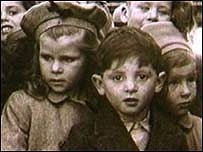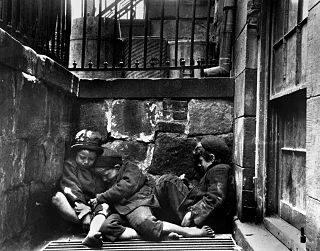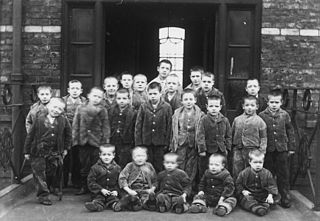
Foster care is a system in which a minor has been placed into a ward, group home, or private home of a state-certified caregiver, referred to as a "foster parent", or with a family member approved by the state. The placement of a "foster child" is normally arranged through the government or a social service agency. The institution, group home, or foster parent is compensated for expenses unless with a family member.

Childcare, also known as day care, is the care and supervision of one or more children, typically ranging from two weeks to 18 years old. When describing a business class, 'daycare' is usually written as a single word. Although most parents spend a significant amount of time caring for their child(ren), childcare typically refers to the care provided by caregivers who are not the child's parents. Childcare is a broad topic that covers a wide spectrum of professionals, institutions, contexts, activities, and social and cultural conventions. Early childcare is an important and often overlooked component of child development.
Reactive attachment disorder (RAD) is described in clinical literature as a severe disorder that can affect children, although these issues do occasionally persist into adulthood. RAD is characterized by markedly disturbed and developmentally inappropriate ways of relating socially in most contexts. It can take the form of a persistent failure to initiate or respond to most social interactions in a developmentally appropriate way—known as the "inhibited form". In the DSM-5, the "disinhibited form" is considered a separate diagnosis named "disinhibited attachment disorder".
A form of child abuse, child neglect is an act of caregivers that results in depriving a child of their basic needs, such as the failure to provide adequate supervision, health care, clothing, or housing, as well as other physical, emotional, social, educational, and safety needs. All societies have established that there are necessary behaviours a caregiver must provide for a child to develop physically, socially, and emotionally. Causes of neglect may result from several parenting problems including mental disorders, unplanned pregnancy, substance use disorder, unemployment, over employment, domestic violence, and, in special cases, poverty.
Children's Aid Societies (CAS) are certified non-governmental child protection organizations in Ontario, Canada which operate independently of the Ontario Ministry of Children, Community, and Youth Services to provide child protection services. The declared goal of CAS is to "promote the best interests, protection and well being of children".
Foster children in Canada are known as permanent wards. A ward is someone, in this case a child, placed under protection of a legal guardian and are the legal responsibility of the government. Census data from 2011 counted children in foster care for the first time, counting 47,885 children in care. The majority of foster children – 29,590, or about 62% – were aged 14 and under. The wards remain under the care of the government until they "age out of care." This age is different depending on the province.
Kinship care is a term used in the United States and Great Britain for the raising of children by grandparents, other extended family members, and unrelated adults with whom they have a close family-like relationship such as godparents and close family friends because biological parents are unable to do so for whatever reason. Legal custody of a child may or may not be involved, and the child may be related by blood, marriage, or adoption. This arrangement is also known as "kincare" or "relative care." Kinship placement may reduce the number of home placements children experience; allow children to maintain connections to communities, schools, and family members; and increase the likelihood of eventual reunification with birth parents. It is less costly to taxpayers than formal foster care and keeps many children out of the foster care system. "Grandfamily" is a recently coined term in the United States that refers to families engaged in kinship care.

The Ministry of Children and Family Development (MCFD) is a ministry of the government of British Columbia in Canada. The MCFD is responsible for the child protection service across the province and is provided through 429 ministry offices in 5 regions and a number of delegated Indigenous agencies. The child protection staff are supported by the provincial office of the Child Protection Division.
Child protective services (CPS) is the name of an agency responsible for providing child protection, which includes responding to reports of child abuse or neglect. Some countries and US states use other names, often attempting to reflect more family-centered practices, such as department of children and family services (DCFS). CPS is also sometimes known by the name of department of social services, though these terms more often have a broader meaning.

British Columbia Children's Hospital is a medical facility located in Vancouver, British Columbia, and is an agency of the Provincial Health Services Authority. It specializes in health care for patients from birth to 16 years of age. It is also a teaching and research facility for children's medicine. The hospital includes the Sunny Hill Health Centre, which provides specialized services to children and youth with developmental disabilities aged birth to 16 years.
Attachment-based therapy applies to interventions or approaches based on attachment theory, originated by John Bowlby. These range from individual therapeutic approaches to public health programs to interventions specifically designed for foster carers. Although attachment theory has become a major scientific theory of socioemotional development with one of the broadest, deepest research lines in modern psychology, attachment theory has, until recently, been less clinically applied than theories with far less empirical support. This may be partly due to lack of attention paid to clinical application by Bowlby himself and partly due to broader meanings of the word 'attachment' used amongst practitioners. It may also be partly due to the mistaken association of attachment theory with the pseudo-scientific interventions misleadingly known as attachment therapy. The approaches set out below are examples of recent clinical applications of attachment theory by mainstream attachment theorists and clinicians and are aimed at infants or children who have developed or are at risk of developing less desirable, insecure attachment styles or an attachment disorder.
S.K.H. St. Christopher's Home is a child-focused Christian social service organisation in Hong Kong founded by Bishop R.O. Hall in 1935. It is the largest non-governmental organisation in Hong Kong providing small group home service for children who cannot receive adequate family care.

Friends-International (FI) is an international social enterprise and registered non-governmental organization focusing on children's empowerment established in Cambodia in 1994. Its mission is "to build a future where all children are safe from all forms of abuse, are able to become productive citizens of their countries and contribute to a more equitable and sustainable world." FI works in Cambodia, Indonesia, Laos, Thailand and with almost 50 partners around the world, providing social services to marginalized urban young people and their families.
The Future of Families and Child Wellbeing Study (FFCWS) is a longitudinal birth cohort study of American families. Formerly known as the Fragile Families and Child Wellbeing Study, the study’s name was changed in January 2023.

Foster care is the term used for a system in which a minor who has been made a ward or a non-minor, typically aged 18–21, who volunteers for placement, is placed in a relative placement, a non-related extended family (NREFM) placement, a community family home, an institution, or a group home. Relative, NREFM, and community caregivers certified by the state are typically referred to as "foster parents," "kin caregivers," "resource parents," or other local terms. The placement of the child is usually arranged through state or county social services. The institution, group home, or caregiver is reimbursed for the expenses related to caring for the child. The state via the family court and child protection agency stand in loco parentis to the minor, making all legal decisions, while the caregiver is responsible for the day-to-day care of the minor. Even while their child is in Care, typically birth parents retain Education and Medical rights and the right to contact with their child unless parental rights are terminated by the Court.

Foster care in the modern sense was first introduced in the United Kingdom in 1853 when Reverend John Armistead removed children from a workhouse in Cheshire, and placed them with foster families. The local council was legally responsible for the children, and paid the foster parents a sum equal to the cost of maintaining the child in the workhouse.
North Carolina LINKS is a program of the North Carolina Department of Health and Human Services, Division of Social Services.

The New York City Administration for Children's Services (ACS) is a New York City government agency that prosecutes parents, caregivers, and juveniles in child protective service and delinquency proceedings in New York City. ACS has been the subject of numerous civil rights lawsuits involving the wrongful removals and deaths of children as well as constitutional violations of both parents and children.
Residential child care communities or children's homes are a type of residential care, which refers to long-term care given to children who cannot stay in their birth family home. There are two different approaches towards residential care: The family model and the shift care model.
Out-of-home placements are an alternative form of care when children must be removed from their homes. Children who are placed out of the home differ in the types and severity of maltreatment experienced compared to children who remain in the home. One-half to two-thirds of youth have experienced a traumatic event leading to increased awareness and growing literature on the impact of trauma on youth. The most common reasons for out-of-home placements are due to physical or sexual abuse, violence, and neglect. Youth who are at risk in their own homes for abuse, neglect, or maltreatment, as well as youth with severe emotional and behavior issues, are placed out of the home with extended family and friends, foster care, or in residential facilities. Out-of-home placements aim to provide children with safety and stability. This temporary, safe environment allows youth to have their physical, mental, moral, and social needs met. However, these youth are in a vulnerable position for experiencing repeated abuse and neglect.







